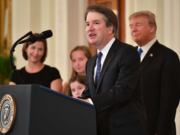Well this comes as no surprise at all:
Advocates for campaign finance reform believe they have an opportunity, in President Obama’s second term, to blow the lid on the political spending of corporate America.
Reformers were buoyed by the news this week that Mary Schapiro will step down as chairwoman of the Securities and Exchange Commission (SEC), and are hopeful the next leader of the agency will be more receptive to a petition that calls for forced disclosure of political activities by publicly traded companies.
The Hill coverage of this issue rightly acknowledges that, should the petition be successful in producing legislation, it would “send shockwaves through Washington, where corporate money flows to a panoply of trade groups and associations that lobby the government. Many of those groups keep their donors secret.”
Leaving aside that last tidbit about secret donors for the moment, a representative from the Chamber of Commerce, Lisa Burgess, noted that the Chamber is preparing to submit a letter indicating they do not support the measure on grounds that the “‘apparent goal’ of the effort is ‘to silence the business community by creating an atmosphere of intimidation under the cover of investor protection.’
Phil Kerpen, former Vice President for Policy with Americans for Prosperity, echoed that sentiment at the time:
“It is outrageous for the Securities and Exchange Commission to even consider doing an end-run around Congress, the courts and the FEC by creating for itself a new mission to regulate political speech,” said Phil Kerpen, AFP’s then-vice president of policy, and Steven Lonegan, the group’s New Jersey state director, in a January 2012 letter to the SEC.
The group was one of the biggest political spenders this last campaign, spending more than $39 million on electioneering communications and independent expenditures, according to the Center for Responsive Politics.
While supporters of the petition say that it’s simply a way for campaign finance reformers to finally get their issue noticed after having no luck with a deadlocked Federal Election Commission nor Congress, there may be another reason to strike this iron while it’s blazing hot; and it has everything to do with the changing role of super PACs from independent expenditure spenders largely concerned with advertising into lobbying arms for donors with political interests.
Since, as The Hill points out,
The August 2011 petition filed with the SEC asks officials to propose a regulation that would force publicly traded corporations to reveal their political giving to shareholders.,
it’s not a leap of faith to suggest that this is the same strategy of trying to squash political speech applied to a changing super PAC landscape. For CCP’s take on this issue, read Legal Director Allen Dickerson’s answer to the question of corporate political disclosure in a blog post inspired by a mention in a Thomson Reuters piece on materiality.
But there’s something different about political activity. Shareholders shouldn’t be required to subsidize political speech they disagree with.
Well, if that’s true, what about all the other things corporations talk about? Why don’t we disclose immaterial spending on ads touting a corporation’s labor-friendly policies? Or discussing its charitable work? Or its contributions to the Sierra Club and the Boy Scouts? Don’t those have a political component, and don’t some shareholders – almost certainty – disagree with those positions? Once we start ignoring materiality, we have to start disclosing other things if we want to be consistent.
And what about other activity with a political element or with which some shareholders might disagree? Investments in certain countries, particular clauses in union agreements, zoning variances… if the mere potential for disagreement, on political grounds, necessitates disclosure, then corporate disclosure is going to rapidly expand. And that both costs money (the shareholders’ money) and hides the really important facts that should be driving a company’s market value.
We’ll have more information on this issue as it develops.














